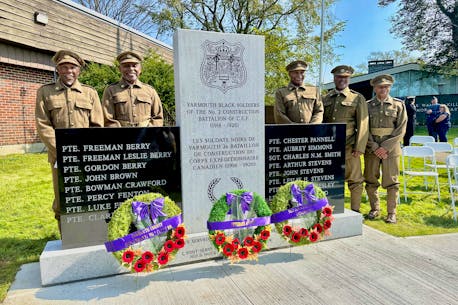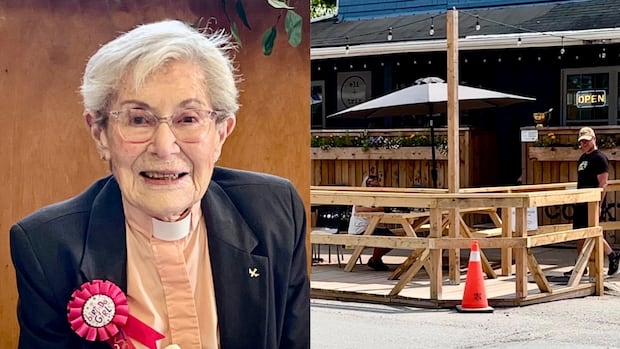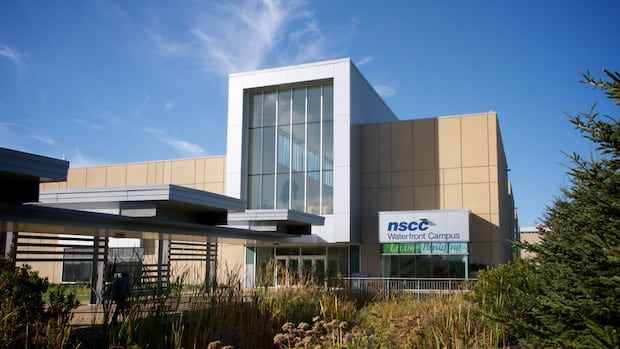Federal funding to help tell story of No. 2 Construction Battalion

The No. 2 Black Construction Battalion should finally move out from under the veil of racism to have the story of its considerable military contribution told with the influx of federal funding.
Federal Defence Minister Bill Blair and Ginette Petitpas Taylor, the minister of Veterans Affairs, announced a $2.25-million investment Friday morning in funding to honour the battalion.
The announcement took place in Cherry Brook at the Black Cultural Centre for Nova Scotia, a long-standing champion of the legacy of No. 2 Construction Battalion.
“The contributions of No. 2 Construction Battalion members to the First World War effort were invaluable, yet they faced systemic anti-Black racism throughout and after the war,” Blair said in a release.
The Defence Department’s financial commitment over five years will provide for commemorative activities, educational materials, and community war memorials to commemorate the No. 2 Construction Battalion, the only all-Black battalion-sized formation in Canadian military history.
“The story of No. 2 Construction Battalion is one of resilience, determination, and strength in the face of adversity,” Blair said. “Acknowledging the experiences of these brave men and promoting their legacy is an important step in reconciling past wrongs and promoting diversity and inclusion within the Canadian military today and in the future.”
The No. 2 Construction Battalion, a segregated non-combatant unit, was created on July 5, 1916, during the First World War.
Throughout the First World War, members of No. 2 Construction Battalion faced racism. Following the end of this war, the unit was officially disbanded on Sept. 15, 1920, without ceremony or recognition for their service or sacrifices on behalf of Canada.
Apology
In July 2022, Prime Minister Justin Trudeau and then-Defence Minister Anita Anand delivered an historic apology in Truro to the descendants of the battalion, with input from the National Apology Advisory Committee (NAAC), which made eight recommendations to guide the apology.
The NAAC developed its recommendations after conducting cross-Canada community engagement with more than 1,200 people, of whom 400 self-identified as descendants of the No. 2 Construction Battalion.
The prime minister apologized “for the government’s appalling mistreatment of soldiers who served in the battalion, and to their families, descendants, and communities.

“For the blatant anti-Black hate and systemic racism that denied these men dignity in life and in death, we are sorry,” Trudeau said.
“One of the most selfless things a person can do is stand up and volunteer to fight for their country – it is an act of extraordinary bravery, honour, sacrifice, and loyalty. At the onset of the First World War, many Black volunteers were turned away when they offered to sacrifice their lives for us all.”
Yarmouth ceremony
During a Sept. 22, 2022, ceremony in Yarmouth, the Yarmouth Black soldiers of the battalion finally received the fanfare they rightfully deserved more than 100 years ago, with the unveiling and dedication of a monument bearing their names and an interpretive panel recounting their story.
It was a project 18 months in the making.

“I was very proud when I started to research how many soldiers we had and were willing to go, were willing to serve, even though they weren’t given a chance to fight,” Yarmouth resident Chuck Smith, whose grandfather Sgt. Charles Nathan Smith was a battalion member, said at the ceremony.
The monument is located alongside the Yarmouth Cenotaph on Main Street.
For the longest time, no one was truly aware of Canada’s first and only Black battalion but that largely changed in 1987, when Senator Calvin Ruck, a human rights activist who grew up in Cape Breton, wrote the book The Black Battalion 1916-1920: Canada’s Best Kept Military Secret.
Overt racism
Ruck told the story of the overt racism and mistreatment members of the battalion were subjected to.
Ruck passed away in October 2004. His wife Joyce, who was born in Yarmouth, and their son Douglas were at the Yarmouth ceremony.
“My father had a very simple objective: to tell the story and to make it known,” Douglas Ruck, a lawyer who promotes and supports human rights, said at the Yarmouth event. “He’d be delighted to see this.”
Douglas Ruck said he hoped that other towns and communities would follow Yarmouth’s lead in erecting their own monuments and Friday’s announcement should help make that possible.
“My father had a very simple objective: to tell the story and to make it known.”
– Douglas Ruck
“The extensive contributions of No. 2 Construction Battalion members to Canada’s war effort deserve to be recognized and properly honoured,” Pettipas Taylor said in the funding announcement release.
“A chapter in our history, today’s announcement will help preserve their legacy to be shared with generations to come,” she said.
Darrell Samson, MP for Sackville-Preston-Chezzetcook, said the Black Cultural Centre has done outstanding work to commemorate the men who served in No. 2 Construction Battalion, and to ensure that more Canadians learn about that important part of the country’s military history.
Russell Grosse, executive director of the cultural centre and co-chairman of the National Apology Advisory Committee, said the funding launched in the spirit of the No. 2 Construction Battalion “is another example of the work we’re doing in partnership with the government of Canada to ensure the memory of those brave Black men, who overcame great obstacles to serve, will live on for future generations.”
Friday’s announcement was followed by a presentation of the first No. 2 Construction Battalion camp flag to the Black Cultural Centre for Nova Scotia for commemoration.





